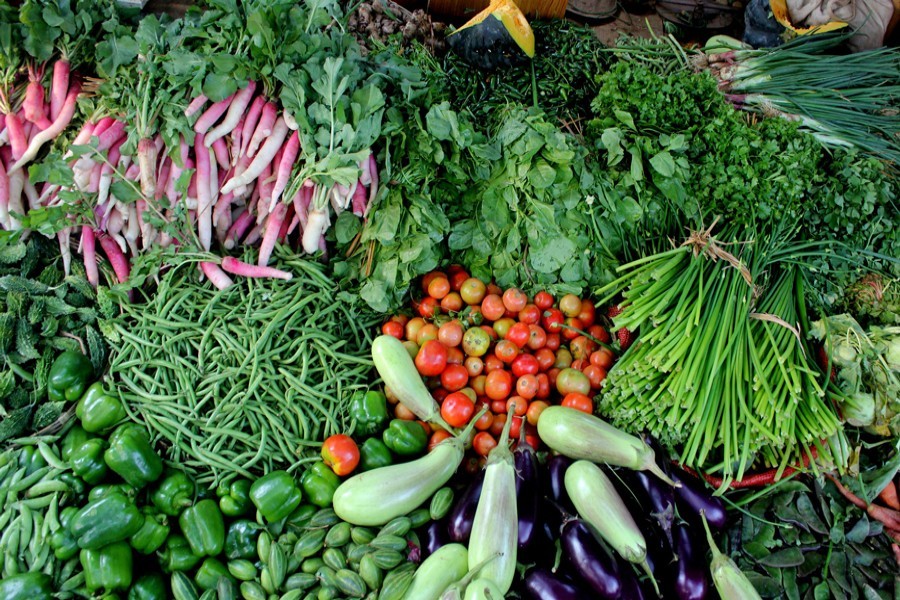Gap in the prices of different seasonal vegetables between farm and retail levels has widened sharply in recent times.
As a result, consumers are now paying higher prices for fresh produce, and farmers are forced to sell them at throwaway prices, which is ultimately benefitting only middlemen.
Considering the prices of tomato, cauliflower, cabbage, carrot, turnip, seasonal bean and five kinds of leafy vegetables, a 100-566 per cent price gap between farm level and retail level now exists, forcing the consumers to buy the seasonal nutrition-rich produces at much higher rates, official data revealed.
Tomato is being sold at Tk 3-4 a kilogram at farmers' end in Rajshahi, Rangpur, Bogra and Comilla regions. It was traded at Tk 20-25 a kg in the city's retail markets on Thursday, marking a 525-566 per cent price gap between field and consumer levels, according to the Department of Agricultural Marketing (DAM) data.
DAM also found a 100 per cent price gap in bean, 300 per cent in cauliflower and 150 per cent in cabbage, carrot, turnip and radish, 230 per cent in turnip and 200-300 per cent in spinach, bottle gourd leaf, red amaranth, mustard leaf and green amaranth.
TM Rashed Khan, assistant director at DAM, told the FE that cauliflower had been selling at Tk 20-30 per piece in Dhaka for last seven days, which was traded at Tk 5-6 in Bogra during the period.
Carrot, radish and turnip were trading at Tk 10-12 a kg in Narsingdi, Comilla and Rangpur, which were retailing at Tk 25-30 a kg in the capital.
Leafy, however, was traded at Tk 8 (red amaranth), while Tk 40 (bottle gourd leaf) a bunch in the city retails on Thursday.
According to the Department of Agriculture Extension (DAE), a total of 0.55 million hectares of land have been brought under vegetable farming this winter season that was 0.54 million hectares last year. DAE is expecting a record output of 11.4 million tonnes of vegetables this season.
The city wholesalers and retailers, however, blamed each other for such high prices of vegetables despite ample supply.
Extortion on the highways and city markets was also responsible for higher prices of vegetables, they said.
Experts suggested setting up farmers' markets in the cities to minimise the influence of the middlemen to ensure fair prices both for the farmers and the consumers.
They also urged the government to provide storage facility in each union to help farmers bargain for their produce.
Secretary of Uttar Karwan Bazar Babosayee Janokalyan Samity Jamal Uddin Babul told the FE that the prices of vegetables were much higher in Bogra, Dinajpur, Rangpur, Rajshahi, Dhaka and Jessore regions until the first week of February following low supply at farm level.
He said the prices of vegetables started dropping for the last one week, which has also been reflected in the markets.
"We are selling tomato at Tk 550-650 per 50-kg carriage (Tk 11-13 per kg) for the last three days against our buying prices of Tk 450-550," he added.
He said cauliflower is being sold at Tk 10-12 per piece, which is retailing at Tk 25-30 in the markets like Hatirpool and New Market.
Jainal Abedin Montu, a vendor at Mohammadpur Krishi Market in the city, told the FE that the wholesalers are yet to reduce the prices of vegetables as expected by them.
"We are still buying bean at Tk 45-47 a kg at Karwan Bazar while it is being sold at Tk 22-24 at farm level," he said.
Shahabuddin Babul, a vendor at Jigatola in the city, alleged that they have to pay additional Tk 4-5 per kg as extortion while releasing veggies from Karwan Bazar or Rayerbazar-Beribadh wholesales.
"Apart from levy, we are forced to give extra money to different organisations in the name of development of markets," he added.
Imran Ali Master, president of Bangladesh Vegetable Wholesalers Association, said they are regular victims of extortion.
He said the traders are forced to pay Tk 3,000-4,000 per truck to many organisations related to the transport sector in more than 20 places between Rangpur and Dhaka.
"The law-enforcement agencies on the highways are doing nothing regarding the matter, as many political leaders are involved with the extortion process," he alleged.
Dr Md Asaduzzaman, professorial fellow at the state-run Bangladesh Institute of Development Studies (BIDS), told the FE that vegetables reach the consumers' end after changing at least five hands.
Strict market monitoring is needed to reduce the price gap between farm and consumer levels. Farmers' markets should be opened in the cities which can benefit both the farmers and the buyers.
A 25-40 per cent post-harvest loss is also a key reason behind the farmers' owes, he said.
Cold storage facility should be made available to the farmers in each union, which might help them sell crops at suitable time and minimise post-harvest loss.


